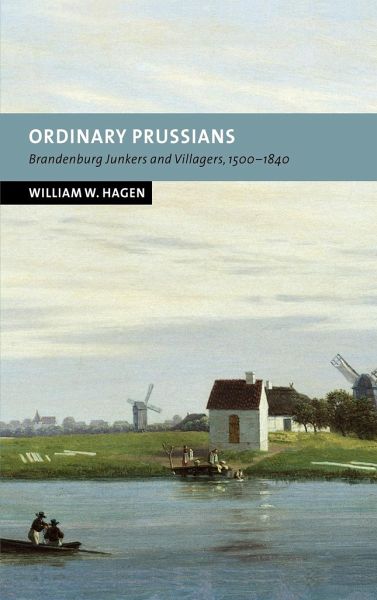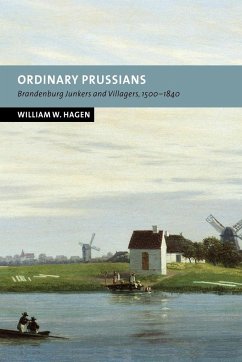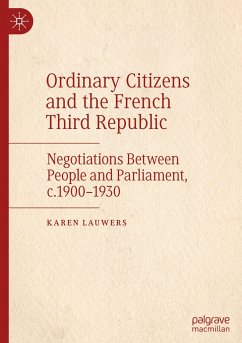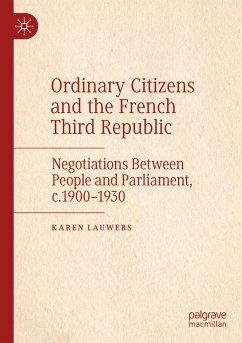
Ordinary Prussians
Brandenburg Junkers and Villagers, 1500 1840
Herausgeber: Baldwin, Peter; Clark, Christopher

PAYBACK Punkte
81 °P sammeln!
This book gives voice, in unprecedented depth and immediacy, to ordinary villagers and landlords (Junkers) in the Prussian-German countryside, from the late Middle Ages to the nineteenth century. The trials and fortunes of everyday life come into view - in the family, the workplace, in the private lives of both men and women, in courtroom and jailhouse, and under the gaze of the rising Prussian monarchy's officials and army officers. What emerges is a many-dimensioned, long-term study of a rural society, inviting comparisons on a world-historical level. The book also puts to a new test the pos...
This book gives voice, in unprecedented depth and immediacy, to ordinary villagers and landlords (Junkers) in the Prussian-German countryside, from the late Middle Ages to the nineteenth century. The trials and fortunes of everyday life come into view - in the family, the workplace, in the private lives of both men and women, in courtroom and jailhouse, and under the gaze of the rising Prussian monarchy's officials and army officers. What emerges is a many-dimensioned, long-term study of a rural society, inviting comparisons on a world-historical level. The book also puts to a new test the possibilities of empirical historical knowledge at the microhistorical or 'grass-roots' level. But it also reconceptualises, on the scale of Prussian-German and European history, the rise of agrarian capitalism, challenging views widespread in the economic history literature on the common people's working standards, and including massive new documentation on women's condition, rights, and social roles.
Table of contents:
Introduction: Grand narratives, ordinary Prussians; 1. After the deluge: sixteenth-century ascent and seventeenth-century crisis of a noble lordship in Brandenburg; 2. The Prussianisation of the countryside? Noble lordship under early absolutism, 1648-1728; 3. Village identities in social practice and law: household and kinship, subject status and property rights, marriage, children, elders, death; 4. Daily bread: village farmers' economic practices and incomes, material culture and living standards, longevity and mortality; 5. The Kleists' good fortune: family strategies and estate management in an eighteenth-century noble lineage; 6. Noble lordship's servitors and clients: estate managers, artisans, clergymen, domestic servants; 7. Farm servants, young and old: landless labourers in the villages and at the manor; 8. Agents and organs of higher authority: seigneurial court, churchly powers, village mayors, state and army in the policing of crime and the moral order, 1700-1760; 9. Policing seigneurial rent: the Kleists' battle with their subjects' insubordination and the villagers' appeals to royal justice, 1727-1806; 10. Seigneurial bond severed: from subject farmers to freeholders, from compulsory estate-labourers to free, 1806-1840; Conclusion; Sources and bibliography.
This book gives voice, in unprecedented depth and immediacy, to ordinary villagers and landlords (Junkers) in the Prussian-German countryside, from the late middle ages to the nineteenth century, making a major contribution to fundamental debates in German history over the origins of modern political authoritarianism.
A major contribution to debates in German history over the origins of modern political authoritarianism.
Table of contents:
Introduction: Grand narratives, ordinary Prussians; 1. After the deluge: sixteenth-century ascent and seventeenth-century crisis of a noble lordship in Brandenburg; 2. The Prussianisation of the countryside? Noble lordship under early absolutism, 1648-1728; 3. Village identities in social practice and law: household and kinship, subject status and property rights, marriage, children, elders, death; 4. Daily bread: village farmers' economic practices and incomes, material culture and living standards, longevity and mortality; 5. The Kleists' good fortune: family strategies and estate management in an eighteenth-century noble lineage; 6. Noble lordship's servitors and clients: estate managers, artisans, clergymen, domestic servants; 7. Farm servants, young and old: landless labourers in the villages and at the manor; 8. Agents and organs of higher authority: seigneurial court, churchly powers, village mayors, state and army in the policing of crime and the moral order, 1700-1760; 9. Policing seigneurial rent: the Kleists' battle with their subjects' insubordination and the villagers' appeals to royal justice, 1727-1806; 10. Seigneurial bond severed: from subject farmers to freeholders, from compulsory estate-labourers to free, 1806-1840; Conclusion; Sources and bibliography.
This book gives voice, in unprecedented depth and immediacy, to ordinary villagers and landlords (Junkers) in the Prussian-German countryside, from the late middle ages to the nineteenth century, making a major contribution to fundamental debates in German history over the origins of modern political authoritarianism.
A major contribution to debates in German history over the origins of modern political authoritarianism.














